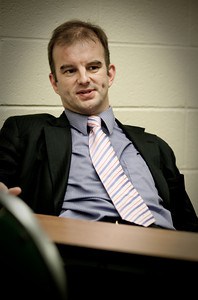Carl Trueman on Gay Marriage

August 9, 2010

In a recent article at Ref21 Carl Trueman points out the uncomfortable reality that for Americans under the age of 35, "gay marriage is not even an issue." As much as I would like for that not to be true, it is inescapable. Trueman also observes that for those of his generation opposition to gay marriage usually has more to do with being weirded out (my own technical phrase) by homosexuality than zeal for biblical sexual ethics. The "generational divide," Trueman writes, "indicate clear challenges to come. The list of such is no doubt long but here are a few:
1. We can no longer assume our children will just agree with us on this issue; they are going to want arguments for holding that homosexual practice is wrong. We need to go back to scripture and sharpen our swords, so to speak, as we can no longer assume that the cultural bias will play our tune anyway.
2. The impossibility of criticising gay culture without being labeled a homophobe means that a whole heap of other cultural traits will fly in under the radar, a point made in a recent Spectator article about the arrival of cell phones `apps' to facilitate cruising and anonymous sexual encounters -- a technological development welcomed by leading gay figures and the media at large. As the gay community prides itself on promiscuity and camp outrage, so any criticism of it on this score is anti-gay. But what of heterosexual promiscuity and outrageous behaviour? It too gets a pass as the behaviour of the gay community stands above criticism and comes to set the cultural agenda.
3. Churches that have sold the pass on other issues -- most notably women's ordination -- are going to find themselves skewered by the need to oppose homosexual practice with a consistent hermeneutic rather than the appearance of arbitrariness based on simple bigotry. I suspect many evangelicals were able to live with women's ordination because, hey, they liked women; women's ordination may have been wrong, but it was not distasteful in the way that two men in bed together is distasteful; they never in their wildest dreams imagined what was coming round the next corner, even though enough people pointed it out to them. Now, if they stand against homosexuality, they look like homophobes. Better to look like an outdated fundie than a bigot. Churches that have held the line on women's ordination can at least say `Nothing personal against homosexuals; we simply follow scriptural criteria' when asked by a practising homosexual why he should not be ordained.
4. Those evangelical leaders, academics and evangelical institutions that prize their place at the table and their invitations to appear on `serious' television programs, and who enjoy being asked to offer their opinion to the wider culture had better be prepared to make a choice. As I have said before in this column, we are not far from the place where to oppose homosexuality will be regarded as in the same moral bracket as white supremacy. Those types only appear on Jerry Springer; and Jerry generally doesn't typically ask them their opinion on the ethics of medical research, the solution to the national debt, or the importance of poetry to a rounded education.
Carl will be relieved to know that I could not agree more. The conclusion he draws in point number 3 is vital. Churches that have practiced a compromised hermeneutic will find it increasingly difficult to oppose homosexuality in an environment where a growing number of people within the church will view such opposition as bigotry. And do not dismiss the connection he makes with the ordination of women. Clearly not all those who favor the ordination of women favor the blessing of homosexual unions. However, once compromises are made with the biblical text in one arena it becomes increasingly difficult to construct boundaries in another. Such attempts appear arbitrary (which, of course, they are).




